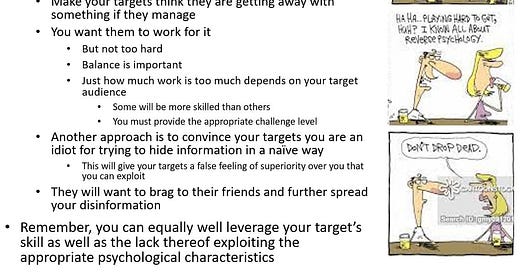The problem with going to social media for “information”.
Yes, this is something I hear about regularly, people saying how they're relying on social media sources for “good information” and seeking it nowhere else.
Social media is so deceptive. Yes, you can get news and information off social media. People have serious conversations and spread the word about real things too. But there’s also the high potential for getting misinformation, disinformation, and malinformation too. Social media is the prime platform of The Internet of Fakes.
There’s no such thing as a perfect source on social media either, no matter the person’s known credentials, because everyone is susceptible to passing on misinformation on social media - it’s set up that way. There are incentives to self-promote rather than do effective communication, and some people are just influencers and are not reliable for leadership.
And a lot of people don’t care about the truth when it comes to their social media habits. Every time I post about block lists being passed around made by people deliberately trying to manipulate, and I point out that the block lists are advertised as being one thing, but then include, peppered in, people someone just wants to shadowban — sources they want to keep people from seeing… I post this, and inevitably someone replies to me by saying that oh yeah they’ve noticed that these lists are tainted, but then justify using these lists to me (as if I care about their self-justifications) by saying oh but it’s worth it just to have an easy list to use. They literally are saying that they are fine with being manipulated, put into silos, and having things kept from them, in order to just block a bunch of people on social media preemptively, even if it’s a lot of people they maybe wouldn’t want to block, and even if it’s manipulating them.
I don’t know why people prefer to be manipulated, other than that some people see being manipulated on social media as a part of the bargain to get their dopamine hits, because the social media is just that addictive maybe? I don’t trust those people, and those are a lot of the people who are posting and reposting stuff on social media, and those are the people who are for real, before you even get to the people who are deliberately acting with deceitful malice.
This is the whole problem with social media “information”.
There’s a serious danger in being put in a silo, and caged off into niche milieus. It’s actually a known tactic for social engineering and disinformation operations, in that walled up people in info cocoons and social silos are easier to confuse, control, and neutralize. And I’ve noticed, and mention this regularly, how it seems to ironically happen more on big social media sites, despite the larger mix of people. Or maybe it’s because of the larger mix of people?
Yet I constantly see people saying they’re going to social media “for information”. Oddly, often for information that’s entirely available and easier to find from reliable sources. But people seem to prefer working harder to try to find information on social media. And bad actors know that, and leverage that cognitive bias.
Rand Waltzman Disinformation 1010 infographic on Linkedin: Make Them Work for It. Make your targets desire the disinformation you are spreading. Make posts that hint at the existence of valuable information that you are trying to keep from them. You can accomplish this in many ways E.g., hint at the existence of (bogus) proxy servers that contain this valuable information and are "tricky" to get to. Make your targets think they are getting away with something if they manage. You want them to work for it. But not too hard. Balance is important. Just how much work is too much depends on your target audience. Some will be more skilled than others. You must provide the appropriate challenge level. Another approach is to convince your targets you are an idiot for trying to hide information in a naïve way. This will give your targets a false feeling of superiority over you that you can exploit. They will want to brag to their friends and further spread your disinformation. Remember, you can equally well leverage your target's skill as well as the lack thereof exploiting the appropriate psychological characteristics.
Many people seem to prefer to get information from pseudonymous influencers for hire, or from even just weird anonymous accounts on social media. But influencers and con artists are notorious for telling people what they want to hear, and it’s hard for people describing reality to compete with that. There’s not a lot of money in telling the truth for the sake of it, that’s for sure.
Social media is not a place to go for “good information” from clout chasting hotshots no matter how tantalizing, fun, or satisfying the sick burns or even the revelations. Even if they’re actually giving good verifiable information most of the time, it’s still not reliable, mainly because of the emotional manipulation involved with the delivery system of these platforms. It’s a place to interact with people, if mostly superficially, which may have its place, but it’s also not a replacement for a functional search engine, or your doctor, no matter how bad some doctors are, nor how enshittified search engines have become. The information space online is definitely getting more and more horrendous, but social media is probably the most risky of it all, and using it requires great caution. And Bluesky is no exception to enshittification.
The bare minimum is that I disregard viral anonymous accounts as not a reliable source for anything, and I don’t let other people, especially not strangers, or influencers, curate my online experience if I can help it.



